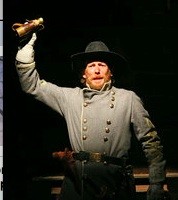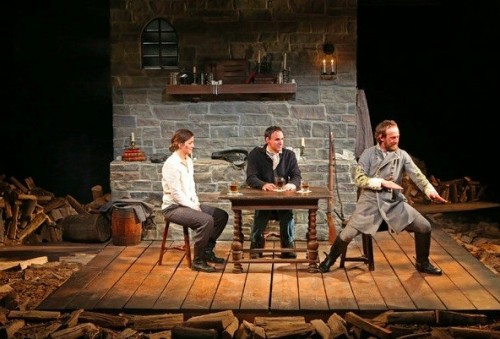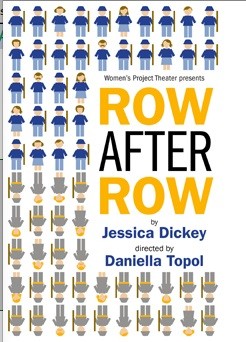Women's Theater Project Presents Row After Row
Jessica Dickey's New Play is Re-enacting
By: Susan Hall - Jan 30, 2014
Row After Row
By Jessica Dickey
Women’s Project Theater
Rosie Benton (Leah), Eric Lochtefeld (Tom), PJ Sosko (Cal).
New York, New York
Thru February 16, 2014
The Women’s Project Theater offers up engaging productions, often world premiers. Last year, they presented unique looks at the subprime mortgage crisis, Jackie O and our collapsing infrastructure.
Every element of their productions is first-rate: the acting, scenes, lighting and sound. If all the i’s are not dotted in the script, the audience still gets a superb evening of entertainment.
This year’s first presentation is no exception. Row After Row is by the gifted young playwright Jessica Dickey. Her eye for the dramatic moment is clear from the very first image, a Civil War soldier barking orders from a hill, surrounded by the sounds of battle and warriors’ cries.
Give yourself up to it. You are at the turning point of the Civil War, sharing in Pickett’s charge up Cemetery Ridge. General Longstreet warned Lee, but to no avail. A Union victory ensued and so the war turned. This play is in part about taking turns. Time is tiered: the past Civil War, its present day re-enactment; the contemporary lives of the enactors.
Behind the hill is a very old-fashioned room in a tavern where the troops gather after the battle. While Confederate soldiers were summarily shot down, row after row by the Union soldiers, the rich title of the play can also be pronounced with an 'ow’ like ‘ouch.’ Rows take place in the tavern, but they are not typical.
Two male soldiers have accepted a young woman’s presence at their table for a post-reenactment gathering. The play’s three characters have just participated in the 150th anniversary of the Battle of Gettysburg; each participant for a different reason.
Cal is clearly the most dedicated. He has spent a small fortune on a uniform and a Spencer carbine, which some historians consider the decisive factor in the battle. PJ Sosko playing Cal relishes his role in re-enactments, which he travels the country to participate in: Antietam et cetera. When he talks about them, he is at high pitch and thrilled with life.
Outside the role is another matter. He seems confused and emotionally distraught and Sosko, under the brilliant direction of Daniella Topol, weaves his persona seamlessly between various moods.
Leah, in a magical creation by Rosie Benton, is both tough and vulnerable. She has retreated to her hometown Gettysburg to gather herself together after missteps in a larger world. In the opening scene, she sits on the hillside musing about the battle. Her first definitive act however is to withstand Cal’s request that she leave ‘his’ table so he can drink alone with his buddy Tom. It's a ritual they have performed time after time. A row ensues. But Tom convinces Cal that this is not 1863, and they have no choice but to welcome Leah.
Leah it turns out has been thrilled by the battle. This surprises her, and delights Cal.
Tom is a high school history teacher who is a reluctant participant in reenactments. He always plays the deserter, standing at the sidelines while history marches by. On this day, he is in a tavern while his teacher’s union wages battle on a vote on education funding and his wife is about to deliver a baby. Tom is lost, but his decency, suggested in gesture and tone by Eric Lochtefeld, is moving.
Transitions in time are sometimes confusing, but the role of re-enactment is not. For Cal it brings back the glory days. For Leah it's a chance to make new friends in a town she has just come back to. For Tom it's a chance to desert yet again.
Dickey’s language veers between richly evocative and downright soldier-crude. It is wonderful.
The set is a brilliant stroke by Clint Ramos. Tyler Micoleau’s lighting allows the mind to slip between past and present. The sounds created by Broken Chord take you right to stage time.
While you might wish for a richer play between acting, re-enacting and real life, Row After Row is an engaging start on a highly unusual and theatrical idea. The Women’s Project Theater has triumphed yet again.




